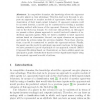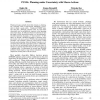250 search results - page 7 / 50 » Learning action effects in partially observable domains |
ROBOCUP
2004
Springer
15 years 5 months ago
2004
Springer
In competitive domains, the knowledge about the opponent can give players a clear advantage. This idea lead us in the past to propose an approach to acquire models of opponents, ba...
HICSS
2009
IEEE
15 years 6 months ago
2009
IEEE
Three training modules were designed to decrease ingroup dynamics in Partially Distributed Teams, which have two or more geographically separated subteams. The action research ori...
UAI
2000
15 years 1 months ago
2000
Cooperative games are those in which both agents share the same payoff structure. Valuebased reinforcement-learning algorithms, such as variants of Q-learning, have been applied t...
AAAI
2010
15 years 1 months ago
2010
Planning in large, partially observable domains is challenging, especially when a long-horizon lookahead is necessary to obtain a good policy. Traditional POMDP planners that plan...
LAMAS
2005
Springer
15 years 5 months ago
2005
Springer
Use of tags to limit partner selection for playing has been shown to produce stable cooperation in agent populations playing the Prisoner’s Dilemma game. There is, however, a lac...


